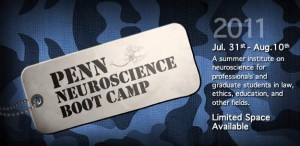Neuroscience Boot Camp: For Anybody who Needs to Understand, Predict or Influence Human Behavior
 I am writing to share some information about our third annual “Neuroscience Boot Camp,” which I think the readers of the SharpBrains blog will find interesting.
I am writing to share some information about our third annual “Neuroscience Boot Camp,” which I think the readers of the SharpBrains blog will find interesting.
The University of Pennsylvania announces their 3rd annual Neuroscience Boot Camp, July 31-August 10, 2011!
Why Neuroscience Boot Camp?
Neuroscience is increasingly relevant to a number of professions and academic disciplines beyond its traditional medical applications. Lawyers, educators, economists and businesspeople, as well as scholars of philosophy, sociology, applied ethics and policy, are incorporating the concepts and methods of neuroscience into their work. Indeed, for any field in which it is important to understand, predict or influence human behavior, neuroscience will play an increasing role.
The Penn Neuroscience Boot Camp gives participants a basic foundation in cognitive and affective neuroscience and equips them to be informed consumers of neuroscience research.
What happens at Neuroscience Boot Camp?
Through a combination of lectures, break-out groups, panel discussions and laboratory visits, participants will gain an understanding of the methods of neuroscience and key findings on the cognitive and social-emotional functions of the brain, lifespan development and disorders of brain function. Each lecture will be followed by extensive Q&A. Break-out groups allow participants to delve more deeply into topics of relevance to their fields. Laboratory visits will include trips to an MRI scanner, an EEG/ERP lab, an animal neurophysiology lab, and a transcranial magnetic stimulation lab.
Participants will also have access to an extensive online library of copyrighted materials selected for relevance to the Boot Camp, including classic and review articles and textbook chapters in cognitive and affective neuroscience and the applications of neuroscience to diverse fields.
See here for a daily blog post from our first Boot Camp.
Who should apply?
College and university faculty, working professionals and graduate students are encouraged to apply. The only prerequisites are a grasp of basic statistics and at least a dim recollection of high school biology and physics. (A short set of readings will be made available prior to the Boot Camp to remind you about the essentials.)
Visit this site for more information!
 — Dr. Farah is the Walter H. Annenberg Professor of Natural Sciences and the Director of the Center for Neuroscience and Society at the University of Pennsylvania. She is interested in a variety of social, legal and ethical issues in neuroscience, including practical issues arising from brain enhancement and brain imaging.
— Dr. Farah is the Walter H. Annenberg Professor of Natural Sciences and the Director of the Center for Neuroscience and Society at the University of Pennsylvania. She is interested in a variety of social, legal and ethical issues in neuroscience, including practical issues arising from brain enhancement and brain imaging.


